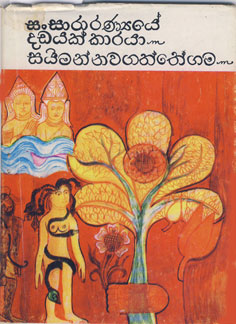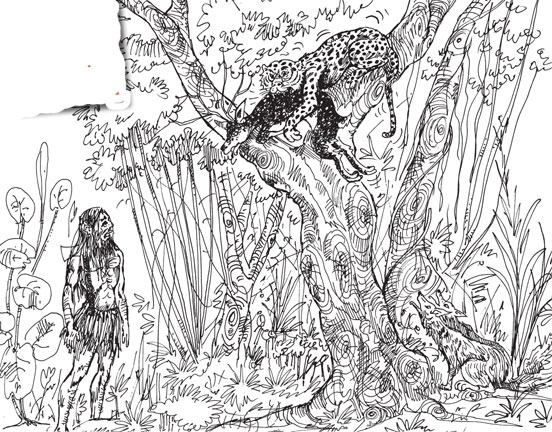|

Vivi's poems: a new genre in Sri Lankan English poetry
Reviewed by Anil Padoda Arachchi
'nothing prepares you' is a collection of poems by Vivimarie
Vanderpoten, a senior lecturer at the Open
University of Sri Lanka, depicting a wide spectrum of themes with
ardent and vivid delineation of intense
conception and sensibility of passion imbued with transient aspect
expounded in Buddhist philosophy.
Though this view is universally felt to be a common one, Vivi's power
of language, rays of creativity and
gleams of genius have an array of meditative poems for the reader to
intellectually fathom into their subject.
 ' Has sorrow nothing to lose ' Has sorrow nothing to lose
Does it therefore sing?
Joy, fearful of envy,
remains silent.
While sadness speaks
does happiness hushed
refuse to tempt fate,
hold close to its bosom
clench tightly
the few treasures
collected from the
debris'
(Page 10)
The poet's words dilute into harmony with profuse and irrepressible
emotions to question "why do you only
ever write sad poems..." and to provide an indirect answer sought
from Buddhist doctrine. Personification
of sorrow and happiness in which sorrow 'sing(s)' and happiness
'hushed' brings out the appearance of
mundane life submerging the reality of life - impermanence and
transience- where happiness is only 'the
few treasures collected from the debris.' The definite article 'the'
before the word 'few' the word 'collected'
and the imagery of comparing happiness to 'a child who/on the beach
has found/a few bits of/coloured
glass' capture the essence of Buddhism.
What strikes me most is Vivi's philosophy which I personally feel has
been shaped and moulded by
Buddhist philosophy.
In the poem 'Desire', she uses the hackneyed metaphor - desire is a
moth- to query the essence with a
liberal perspective which itself is an ingrained aspect of Buddhism.
'Desire is a moth
drawn to the flame
we are told;
it stutters stupidly
towards
fire
then, wings singed,
destructs.
time-tested truth
notwithstanding
I can't help but wonder
Does the flame
bear no blame
for the ruin '
of gauzy wings? (Page 17)
Here the flux of words, the alliteration in 'stutters stupidly' and
the half rhyme and short 'i' sound in 'wings
and singed' picture how easily we are attached to lustful world and
get ourselves destroyed simply because
of our stupidity and ignorance. Her argument also makes us think
whether ignorance is a phenomenon that
exists irrespective of if it is perceived by us. For me the word
'gauzy' implies the disease-stricken, fragile
world. It can also mean material made of a network of wire
symbolizing the modern world caught in
complex patterns of life. Placed in this context, what Vivi does here
is to delve into Buddhist philosophy to
comprehend the intricacies of life itself.
In Buddhism, 'Insight meditation' refers to understanding the very
truth or the reality of things found in the
world smothered in a veil of ignorance. In 'Bridesmaid', Vivi is deep
in an insight meditation.
'I-
Alone in the crowded ballroom
Smiled and played my part
And after the show
Watched the flowers drop and fade
Heard the music waver into silence
And die
Like a smile
Like the flowers in my hand
Like love
Like happiness
Sometimes dies.'
(Page 29)
She sees death and decay in the flowers in her hand drooping and
fading and in the music dying down. What
really lies beneath the bright eyes, scent of incense, flashlights
from cameras, jewels and touting music is
nothing but death. She is cynically looking into the encroachment of
western values on the very fabric of our
society and inculcates in us that 'veil of ignorance' which indulges
us in a lifestyle distancing us from reality
of life. She paints a realistic picture of how the liberal economy
ushered in by capitalism spoils the sacred
values we upheld in 'Celebrating Love.'
'Love is to be bought,
Given away to the
highest bidder
It lurks in shopping malls,
only for those who can
Afford it,
It reeks of cash and kitsch.'
(Page 43)
As related to everything in liberal economy, love is caught in the
tentacles of the octopus of buying and
selling, and is sold to the highest bidder. The word 'lurks' suggests
that love manoeuvres insidiously to get
itself bought. 'It reeks of cash and kitsch' presents a canvas of its
sentimentality on one hand and its
obnoxiousness on the other. It all boils down to the fact that people
are so ignorant and they cannot see the
depth of life.
Life is an astonishing thing and we are engrossed in admiration at
some of the transient modifications. The
vicissitudes of life obscure us from the wonder of our being.
Buddhism teaches you to be calm, quiet and
composed in face of both happiness and sadness and victory and
defeat. It teaches you to be content of what
you have today and not to be worried of what you do not possess.
Isn't the poem 'I Have Today' a
wonderfully crafted one portraying this aspect of life? This poem
moves my heart vehemently.
'But
Today
your fingers are entwined possessively
between mine
and your lips are sweet and warm as they
explore the secrets of my soul.
Today in your arms
I find a never-ending afternoon
Tomorrow,
Let the storm come:
I have today.'
(Page 78)
Life is a miracle. And so is the human mind. He who is absorbed in
exploring her soul today is to go away
from her tomorrow. Does this not evoke the feelings of temporary
nature of our relationships? Though the
tone is melancholic, in face of imminent separation she is calm,
restrained and sober with a profound
understanding of the transient nature of life.
According to William Wordsworth, 'the powers requisite for the
production of poetry are, first those of
observation and description, i.e. the ability to observe with
accuracy things as they are in themselves, and
with fidelity to describe them unmodified by any passion or feeling
existing in the mind of the describer.'
Reading Vivi's poetry, one can understand her ability to observe both
natural and social phenomena with
meticulous care and to imaginatively present them with a vision of
her own.
Her sensibility in perceiving the reality of what he observes is
discernable in all the poems found in the
collection. Her genre is innovative and different from that of all
the other Sri Lankan poets. I am of the
opinion her first collection of poetry will carve out a niche in the
field of Sri Lankan English poetry. I hope
she can be more Sri Lankan in her next collection of poetry.
 Sansaaraaranyaye Dadayakkaraya Sansaaraaranyaye Dadayakkaraya
(The hunter in the wilderness of sansara):
By Simon Nawagaththegama
Chapter1 :
(Part 11)
Ancient stories
Stories close to the present
The Giant sat by a gigantic tree one early morning, his axe placed
against the tree trunk. Two foxes loitered
around him, sniffing the air. He knew why their noses were turned
upwards. The leopard had locked in the
crook of the tree the carcass of a deer it had preyed on earlier and
was leisurely having its fill. The Giant was
on his haunches, nibbling a twirl of his considerable beard in the
manner of a buffalo chewing the cud, deep
in thought. He did not lift a finger to wipe away the occasional drop
of blood that fell from the tree. He did
not show any interest in moving to another spot either. The leopard's
was neither a good nor a bad act.
When hungry it sprang among a large herd of deer or other such
creatures, caught one and ate to his fill. It
would not bother them thereafter. Not until it was hungry again would
it take another life.
After a while the leopard started down the tree and slid down the
trunk, testing its claws against the bark. It
looked at the Giant for a while. There was no affection or malice in
his eyes. For this reason, emboldened,
the leopard came to him and licked off the blood that lay clotted
among his facial hair. By and by the Giant
pushed the leopard's snout away and stood up. He picked up his axe,
placed it on his shoulder, and began to
walk. As he approached the foot of the hill just as the first light
invaded the forest, he noticed that the she-
bear that had been lying there for the past three days had not moved
an inch. Upon seeing the hunter,
though, the she-bear got up and rubbed against his massive legs. It
fell on its back waving its paws in the air
as though inviting for play and started saying something to him.
The Giant stepped over the creature and moved away. He stopped as
though he had remembered something
all of a sudden, turned and came towards the she-bear. She had been
there for three whole days. Each time
 she saw the Giant she would get on her back and wave her paws this
way, trying to tell him something. He she saw the Giant she would get on her back and wave her paws this
way, trying to tell him something. He
bent over her. He ran his fingers over her belly and through the
hair. He felt something strange under her
right armpit. He parted the hair carefully. She whimpered in pain. A
large cactus thorn had embedded itself
deep in the flesh. It had created a festering wound. He ran his
fingers gently around the thorn and with a
sudden jerk pulled the thorn out completely. The she-bear cried out
in pain and bit his arm. Her cries were
soft and grateful the next moment as she licked his hand and face. He
looked around and grabbed a handful
of a particular type of grass. He stuffed it into his mouth and
chewed it into a wad. This he then pushed into
the wound and spread what remained around it. He was not interested
in her immense gratitude. He pushed
her snout aside, stood up, placed the axe in the crook of a tree
trunk and measured heavy steps up the
hillside.
That day the Giant could not reach the summit. The Tree Spirit came
running towards him. He seemed
highly excited. He took the Giant's hand. Then he spoke thus in
somber tones, looking deep into the Giant's
eyes:
'Our Hamuduruwo has reached a new plane of comprehension; has turned
into a new path in the search for
Truth. I woke up almost in a dream this morning. I felt my feet
burning in some strange heat. I turned
around and looked. Our Hamuduruwo was not at the foot of the tree
deep in meditation as he usually would
be at this time. There were four strange creatures grappling with the
Hamuduruwo. Fire and smoke arose
from around their feet. I felt that Our Hamuduruwo would be enveloped
in flames the very next moment.
Our Hamuduruwo removed his robe and twirling it round and round
lashed at the flames on the ground.
With each stroke, one flame was snuffed out. Finally, the fire was
completely out and as the fire went out
Our Hamuruduwo's countenance took on the most peaceful look.
The four creatures gradually shrank in size and disappeared. The
Hamuduruwo wore his robe again and
once again took up the lotus position, totally at peace. I am certain
of this; the Hamuduruwo has reached a
different plane in the journey towards enlightenment.'
The Giant listened to all this. The only thing he understood was that
the Hamuduruwo had grappled with
some strange creatures. His hand immediately went to the axe on his
shoulder. He realized he had left it at
the foot of the mountain. He went past the Tree Spirit and walked
quickly towards the Esatu Tree. Seeing
the Hamuduruwo seated in absolute peace all thought of danger left
him. He slowed down. The Giant went
up to the Hamuduruwo and gazed upon that peace-filled face. There
were no signs whatsoever of any
struggle of the kind that the Tree Spirit had described.
After a while the Hamuduruwo opened his eyes and looked at the Giant.
He was happy to see him standing
there. Then, as though he had immediately ceased to appreciate the
Giant's presence and was gazing into
the distant horizon where tree line met sky, the Hamuduruwo began to
preach. The story perplexed the
Giant. The Tree Spirit had informed him that the Hamuduruwo had used
his robe to douse the flames of
some mysterious creatures, that these inflamed creatures had wrestled
with the Hamuduruwo. And yet the
Hamuduruwo expounded a discourse on his own garment.
'There is a Buddhist practice that I have been endowed with. The
Compassionate and All-Knowing One
once spake thus: "Adiththan bhikkave! Khelan va, seesan va,
ajdupekkhitva, amanasikaritva
anabhisamethanan chathunnan ariyasachchanan yathabhoothan
abhisamasaya, adhimaththo chando cha,
vayamo cha, ussaaho cha, ussolhee cha, appaticanee cha, sathi cha
sampagngnan cha karaneeyan" and so on.
He advocated that the bikkhus should in the interest of obtaining
full cognizance of the Four Noble Truths,
cultivate discipline, effort, practice, acute consciousness and
discerning wisdom showing equanimity
towards and being unshaken by a burning robe or an agitated mind.'
The Giant stood tall. His eyes were half closed. He expended much
effort to distill these words and obtain
meaning from them. Since the Hamuduruwo spoke of a burning robe and
not the creatures decked in flames
that had grappled with him, the words of the Hamuduruwo perplexed him
even further.
'The worst that the neglect of a burning robe or a mind in flames can
produce is a single death. Entrapped in
a bonfire a person cannot die seven or eight times but just once. The
inability to comprehend the Four
Noble Truths, however, will ensure a countless number of births and
consequently a countless number of
deaths.'
The Hamuduruwo, having reached a certain plateau in his journey
towards Enlightenment and one which
was mysterious to others and for this reason compelled by great
compassion towards such creatures,
continued to speak to some invisible person right before him or to
the far away horizon or to the open sky.
'There is no limit to the sorrows of birth, decay and death that a
single creature has to suffer through the
long span of sansara.
The dependent originations pertaining to the five aggregates are made
of and for the sorrows of unpleasant
association, the sorrows of separation from pleasant associations and
so on.
If the full volume of sorrow's harshness was so much, if the weight
of nirvanic harshness and sorrow was so
much, if so much were the nirvanic bliss and the fearfulness of
sorrow-weight, then that much would be the
unspeakable lightness of nirvana as well...'
BOOK LAUNCH
Ali Baba saha Horu Hathaliha

Veronica Jayakody's children's story book Ali Baba saha Horu
Hathaliha will be launched at Dayawansa Jayakody Bookshop Colombo 10 on
March 15 at 10 am.
The book has been written to appeal to both children and adults.
It is a Dayawansa Jayakody publication. |

